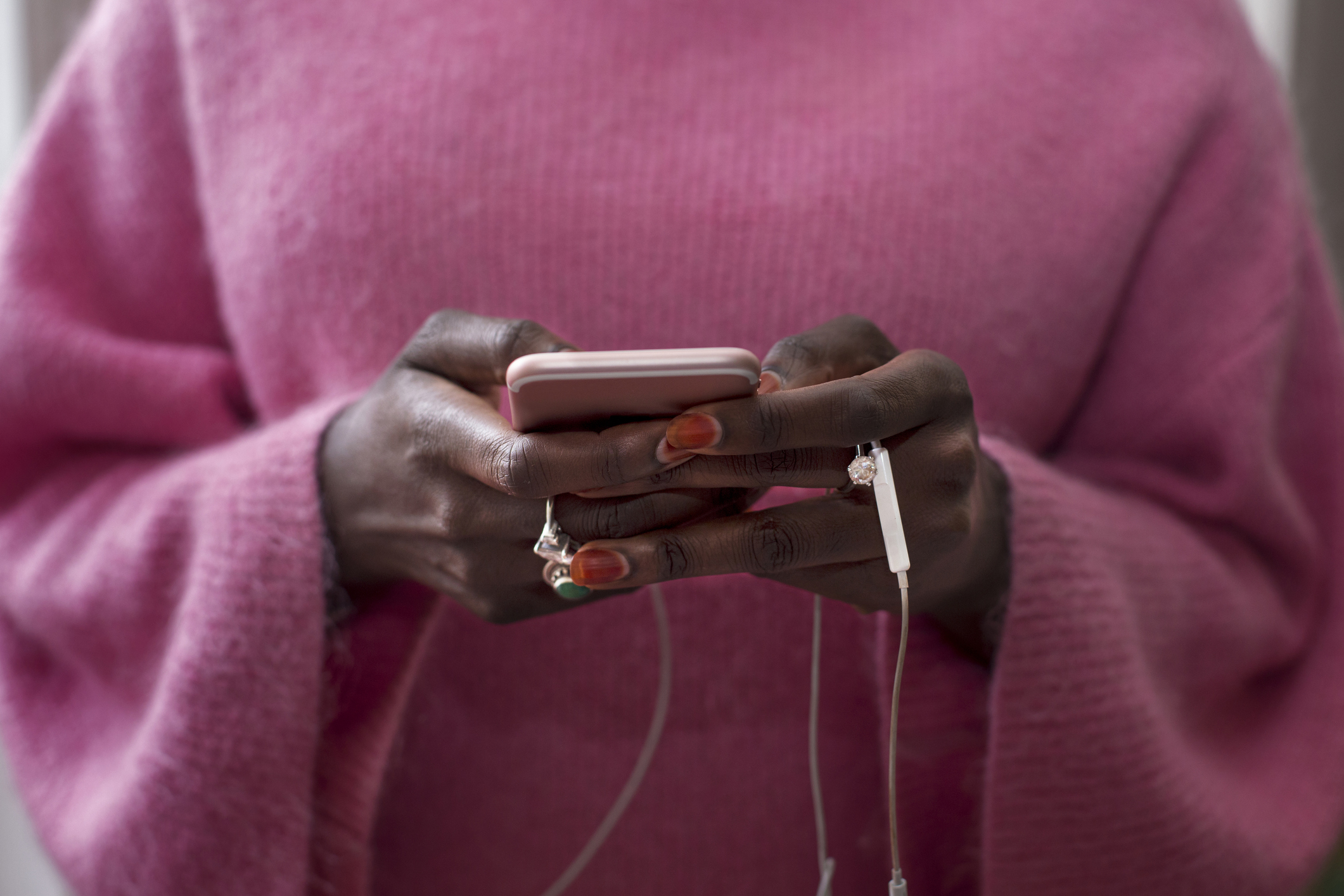How to break up with your phone and ditch your negative news addiction, from an expert
Feel stuck in a loop of social scrolling, negative headline inhaling and, well, feeling quite down? Yep, that's 2021.

Feel stuck in a loop of social scrolling, negative headline inhaling and, well, feeling quite down? Yep, that's 2021.
If you're constantly reading negative news, scrolling Instagram, 0r seeing triggering content on Twitter at the moment, know you're not alone. It can be draining, but, while locked down, also one of the only ways of staying connected with the outside world.
Knowing how to stop a phone addiction, or even identify one in our locked down (and increasingly digital) world, can be tough. As above, it's one of our only ways of keeping in touch with friends and family. But, it won't come as any surprise that Harvard research has found too much screen time can negatively impact your mental health.
According to the Harvard Health site, "besides the simple fact that screen time is sedentary time, too much time in front of a screen effects behaviour - it can affect mood, making [you] anxious or depressed."
That's why we've enlisted the help of two experts, an author and a psychologist. Here, they break down the main warning symptoms, the affect it can have on you and your mental health, and the easiest resources to have to hand if you or someone you know is struggling.
News flash: constantly scrolling social media and negative news is actually really impacting your mental health—and not in a good way.
So, what is a phone addiction?
What is says on the tin, essentially. According to doctor Becky Spelman, psychologist, Private Therapy Clinic, a phone addiction can be pretty hard to spot. "You can normally tell someone is addicted to their phone if they keep compulsively checking it, to the extent where it actually impacts their quality of their life," she explains.
Marie Claire Newsletter
Celebrity news, beauty, fashion advice, and fascinating features, delivered straight to your inbox!
We all use our phones so much that, often, this excessive usage is passed off as normal. It's become even worse during the pandemic, she adds, sharing that "the relentless stream of negative and dramatic news has been draining, and impacted many people’s mental wellbeing."
Sound familiar?

How do I know if I have a phone addiction?
Long and short of it, we probably all do, to some extent. We rely on our phones, now more than ever before, to connect us to the outside world.
But there are different types of phone addiction to be aware of, Spelman explains. "It can take the form of constant addiction, where the individual is consistent in their phone-checking behaviour," she shares. "For others, the habit worsens during times of stress or emotional upset, whereby the phone acts as a distraction." That could be particularly relevant now, mid a global pandemic where many might be catastrophising, struggling with a third lockdown, or coping with re-entry anxiety.
Interestingly, the psychologist shares that many rely on excessive use of their phone as a coping mechanism. "Those truly addicted to their phones tend not to be able to regulate their emotions as effectively as others," she explains, adding that they use their mobile as a means of escaping or suppressing their emotions.
5 symptoms of phone addiction
Want to establish your own reliance on tech? Try the following, she reccomends.
1. Being on your phone more often than not
Become aware of how much time you actually spend on your phone. Ask yourself: if you don’t check it for a while, do you feel nervous or on edge? If so, this may be a sign that you’ve become dependent on your device.
2. Brushing off excessive screen time as 'normal'
How many waking hours do you spend gazing at your phone, and when others touch on it, do you merely pass it off as a necessity?
3. Consistent unproductive days and unfulfilled daily tasks
Are you managing to fit in your workload, daily activities and spending quality time with loved ones? Or do you find that hours can easily pass when you’re on your phone?
4. Comments from others
If you start receiving comments from others about how much you’re on social media or on your phone in general, there may well be a problem.
5. Starting to feel low or down about things you see online
As above, excessive screen time can lead to mental health problems, so if you suspect that you may have phone addiction, now is the time to create new habits and begin to set boundaries for yourself, Spelman shares.
How to stop a phone addiction: 7 simple steps
According to Catherine Price, author of How To Break Up With Your Phone, these are the best ways to have a healthier relationship with your mobile and gain that all important balance.
1. Establish if you're using your phone too much?
Saying you hardly use your phone is fake news. Your screen time will now tell you how many hours you spend on your phone a week and if its more than the average - that's three and a half hours - you've got some work to do.
Claim back your time and put it to good use. Just think of how much you could get done...
2. Stop automatically looking at your phone
You'll all be familiar with the compulsion to pick up your phone on the reg.
But next time you do, ask yourself this: why am I picking my phone up right now?
If it's for no genuine reason, leave it. Simple.
3. Leave your phone in a different room sometimes
Keeping busy = universal break-up survival. Which means, you can totally use it to phase out your addiction to your phone. Go shopping without it; use lazy Sundays for strolling not scrolling; cook a recipe that requires your full attention. Anything but falling into the inevitable rabbit hole of scrolling. How to stop a phone addiction never looked so simple...
4. Turn off your notifications
Alert sounds and red number bubbles are like the ‘just one more drink?’ buddy. Yes, you get a buzz, but it will suck you in and eat your time. Turn off all but essential alerts – calls and VIP emails, ideally. Those Instagram likes and Whatsapp chats will still be there when you're ready to check them, but much better to do it in your own time. What's the urgency, anyway?

5. Declutter your homepage
Social-media apps might spark joy, but if they also cause anxiety and sleep problems and dent self-esteem, it's on you to delete them. Culling too unnerving? Move them from your home screen to page three, inside a folder, making them much more difficult and taking more effort to find. Easy.
6. If you're addicted to your phone, keep it out of reach
‘Out of sight, out of mind’ might not cut it for devices, but ‘out of sight, out of arm’s reach’ will. If you can’t physically grab your phone while in bed, you won’t look at it in bed, which incidentally is seriously damaging to your health. It might be time to get an analogue alarm clock.
7. Have a 24-hour phone break
Like a mini digital detox, if you will. Learning how to stop a phone addiction can be as simple as going cold turkey. Schedule it in (Friday to Saturday night, say) and hit ‘off’. Expect to feel twitchy – it is a detox – and cram your schedule with offline fun instead. One day later, we bet you'll be surprised by how free you feel.

Ally Head is Marie Claire UK's Senior Health and Sustainability Editor, nine-time marathoner, and Boston Qualifying runner. Day-to-day, she heads up all strategy for her pillars, working across commissioning, features, and e-commerce, reporting on the latest health updates, writing the must-read wellness content, and rounding up the genuinely sustainable and squat-proof gym leggings worth *adding to basket*. She also spearheads the brand's annual Women in Sport covers, interviewing and shooting the likes of Mary Earps, Millie Bright, Daryll Neita, and Lavaia Nielsen. She's won a BSME for her sustainability work, regularly hosts panels and presents for events like the Sustainability Awards, and is a stickler for a strong stat, too, seeing over nine million total impressions on the January 2023 Wellness Issue she oversaw. Follow Ally on Instagram for more or get in touch.